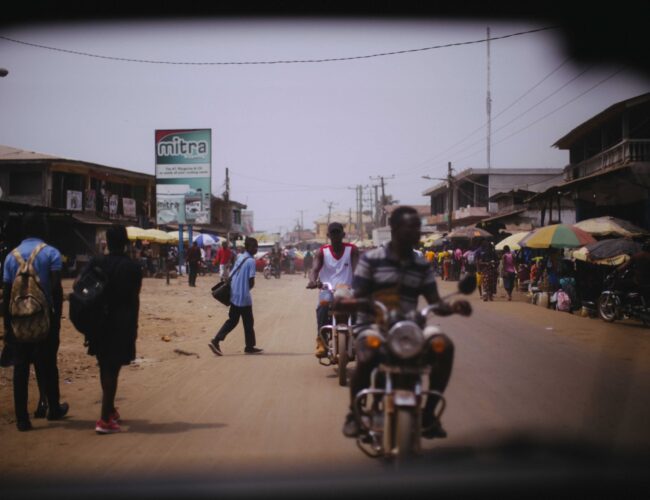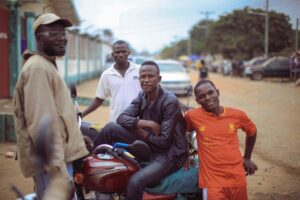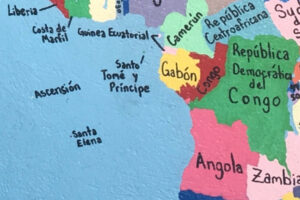Ex-combatant and conflict-affected youth make up the vast majority of Liberia’s 175,000 motorcycle taxi drivers. Motorcycling emerged after Liberia’s civil war as a critical economic sector. It provides cyclists with economic livelihood opportunities and constitutes a space of socio-political youth mobilisation. Through motorcycling, young riders also establish themselves as active peacebuilding subjects, enacting their own ideas to counter the insecurity and marginalisation of post-war life. Motorcycling offers a unique vantage point to understand the long-term post-war challenges facing youth and the multiple roles that young people play after war. This ongoing, multi-year project by Jaremey McMullin started in 2018 and draws from qualitative interviews, focus groups, and participant observation with young cyclists, union leaders, the motorcyclists’ security force (Task Force), and government and civil society stakeholders across multiple sites in Liberia, focused on parking stations (taxi ranks) throughout the country.
The project’s objectives are, first, to interpret the multiple meanings (economic, social, and political) that ex-combatant and conflict-affected youth attach to their participation and association in motorcycling; and second, to analyse how motorcycling is simultaneously a conflict-producing and conflict-mitigating site within post-war Liberia.
Research questions include: How do ex-combatants articulate the significance and meaning of livelihood activities, and in what ways do they articulate motorcycling as a site of post-war well-being? How do they relate labour mobilisation to broader post-war political reintegration? How do young people generate and contribute their own peacebuilding strategies after war? And, how can research approaches better collaborate with youth actors to counter ongoing forms of economic, social, and political marginalisation?
The project has produced a documentary short film series, Liberia: Legacies of Peace, which profiles the people at every level of Liberian society engaged in the hard work of war-to-peace transition since the Liberian civil wars ended in 2003. It is comprised of five short films that narrate everyday dimensions of Liberian peacebuilding:
- Best Man Corner (former child soldier livelihood trajectories in the motorcycle taxi sector)
- Pink Panther (women’s involvement and gender mainstreamining in the motorcycle taxi sector)
- Diamond Boys (long-time diamond miners in Tubmanburg, western Liberia, discuss the impact of war on natural resource livelihood)
- Peace Hut (women grass-roots peace activists in Monrovia)
- 540 (demobilized Armed Forces of Liberia personnel living on Peace Island, a squatter community in Monrovia)
Documentary Film Series Summary: Peace is not an event; it’s an imperfect and unfinished process. Each of the five films in the series builds on this idea by identifying challenges and profiling the innovation and creativity of Liberians as they hustle to survive and build a future that is more just and sustainable than the past. Each story is part of a critical effort to broaden the contributions to peace that get seen and recognized after war stops. The films are structured around critical questions about the study and practice of peacebuilding:
- Where is peace built? Does ex-combatant reintegration happen in temporary vocational training programmes or at the motorcycle taxi ranks where Liberia’s conflict-affected youth wait for passengers and hang out? Were peace and women’s equality achieved at the protest encampments of the 2003 Women of Liberia Mass Action for Peace or within the Peace Huts established in their wake? Where peace gets located determines which peace actions get seen and by whom.
- Who builds peace? If peacebuilding is always unfinished, then to whom does the unfinished work of building peace fall? After UN peacekeepers withdraw and international funding shifts to new emergency contexts, by necessity multiple other actors step up. Everyday peace reflects the inevitable creativity, ingenuity, and tenacity that are mobilised to confront the precarity, inequality, marginalisation, and insecurity that follow the signing of peace agreements.
- When is peace? An analytical shift to the everyday calls into question the time horizons and temporal practices of peacebuilding. When the point of view shifts to the level of ordinary Liberians and the daily struggle to survive, the short-term focus on externally-designed benchmarks or timing of international withdrawal recedes, and different medium- and long-term challenges and priorities come into view.
- How is peacebuilding evaluated? Each film posits a shift in the measurements and objectives designed to evaluate peacebuilding. Each also critiques the standpoint from which peace tends to be evaluated, where state security and international stability get prioritised at the expense of different types and levels of evaluative understanding.
- Where does research fit in? Researchers are privileged actors in determining which peacebuilders and which types of peace get prioritised, and how. Producing and outputting research in different formats alters how subjects participate and collaborate in the research process, and impacts on how participation and collaboration get noticed by students, academics, and practitioners.
- ‘This is Why They Call It 540,’ original song in the film 540. Lyrics by Leaders of the Peace Island 540; Music by Moenue S. Harvey; Performed by Moenue S. Harvey, More Hits Records; Music Supervision by Kennedy K. Berrian.
- Community Perceptions of Commercial Motorcyclists in Liberia, short film on social stigmatisation and marginalisation of ex-combatant and conflict-affected youth in the motorcycling sector. Used in community-cyclist dialogue groups facilitated in Liberian communities that had experienced recent violence, and facilitated by Platform for Dialogue and Peace.
- Nationwide bumper sticker campaign to highlight young cyclists’ contributions to peacebuilding, economic development, and security;
- National radio broadcasts on road safety, the contributions of cyclists to peace, and cyclist efforts to prevent the spread of Ebola and COVID-19;
- Community-cyclist dialogue groups to discuss peaceful dispute resolution and to gauge impact of community perceptions and stigma of cyclists
- Police-cyclist dialogue groups to discuss prevention of roadside accidents, COVID-19 prevention and management, and reduction of police-cyclist violence (2020)
Additional cultural preservation outputs of the project include:
- ‘This is Why They Call It 540,’ original song in the film 540. Lyrics by Leaders of the Peace Island 540; Music by Moenue S. Harvey; Performed by Moenue S. Harvey, More Hits Records; Music Supervision by Kennedy K. Berrian.
- Community Perceptions of Commercial Motorcyclists in Liberia, short film on social stigmatisation and marginalisation of ex-combatant and conflict-affected youth in the motorcycling sector. Used in community-cyclist dialogue groups facilitated in Liberian communities that had experienced recent violence, and facilitated by Platform for Dialogue and Peace.
Impact Generation Activities
At the suggestion of project participants, several collaborative impact activities have focused on redressing social stigmatisation of ex-combatant and conflict-affected youth in the motorcycling sector, and on raising awareness about the critical peacebuilding roles that young cyclists play in post-war Liberia. These have included:
- Nationwide bumper sticker campaign to highlight young cyclists’ contributions to peacebuilding, economic development, and security;
- National radio broadcasts on road safety, the contributions of cyclists to peace, and cyclist efforts to prevent the spread of Ebola and COVID-19;
- Community-cyclist dialogue groups to discuss peaceful dispute resolution and to gauge impact of community perceptions and stigma of cyclists
- Police-cyclist dialogue groups to discuss prevention of roadside accidents, COVID-19 prevention and management, and reduction of police-cyclist violence (2020)
Project partners
Platform for Dialogue and Peace (P4DP) is a Liberian peacebuilding NGO involved in research and participatory action activities aimed at strengthening the capacities of state and non-state actors to prevent, manage and transform conflict through collaborative action. P4DP has been the project’s primary Liberian partner through successive phases, and has facilitated pre-project scoping with Liberian youth and design and implementation of all impact generation activities.
Federation of Motorcyclist and Tricyclist Unions of Liberia (FOMTUL) is a national labour federation of various unions representing the interests of motorcycle and tricycle taxi drivers. It is a non-governmental organisation involved in the advocacy of its members, and dedicated to dispute resolution between communities, law enforcement, and motorcyclists. The federation additionally provides training in road safety, human rights, and small business management.





